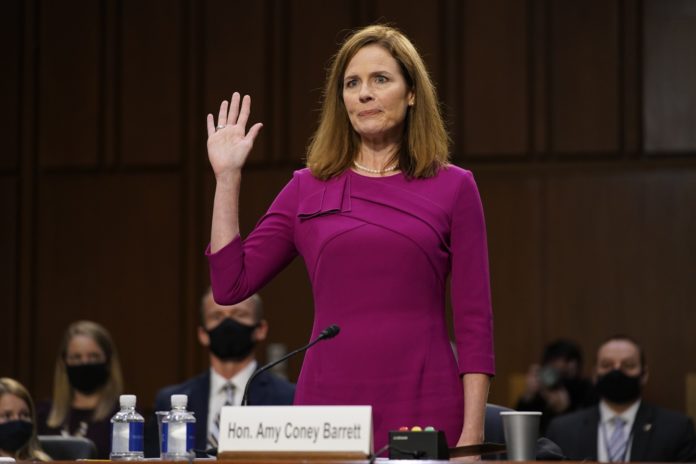
By Meredith Pratt | Staff Writer
As election day draws closer, U.S. citizens anxiously await to see if incumbent President Donald Trump will be reelected or if Democratic candidate Joe Biden will claim victory. However, the presidential race is not the only political variable on the table.
With the recent death of Supreme Court Justice Ruth Bader Ginsburg, a new vacancy on the bench arose, and Trump swiftly nominated Amy Coney Barrett, a federal judge mentored by the late Justice Antonin Scalia. Unlike Ginsburg, who historically interpreted the constitution loosely, Barrett describes herself as an originalist — someone with a strict interpretation of the constitution.
Following several confirmation hearings, the Senate Judiciary Committee is set to vote Oct. 22 on Barrett’s nomination.
Political science professor Dr. Jordan Cash said filling a vacancy in the Supreme Court during an election year is actually not a rare occurrence.
“This isn’t really that unusual in the long history of Supreme Court nominations,” Cash said. “Presidents have to nominate for the Supreme Court — the language in the constitution is that the President shall nominate, so it’s not really a discretionary decision for the president on whether or not they’re going to nominate somebody.”
Cash said that the nomination of Amy Coney Barrett can be compared to President Obama’s nomination of Merrick Garland in 2016 during the last months of his presidency.
“Both of those really fall on what does the Senate want to do. The Senate has a lot of discretion on how they choose to handle presidential nominations, and historically, generally, when the Senate is at the same party as a president, they’ll go ahead and push it through, and when they’re on the opposite party, they won’t,” Cash said. “If you look back historically there are some cases where the senate will just not act or will refuse to confirm the President’s nominee for up to two or three years, so really, this is all about understanding the Senate’s institutional power.”
If Amy Coney Barrett fills the current vacancy, the Supreme Court will have a larger group of justices who lean conservative, Cash said.
“Justice Ginsburg was obviously on more of the liberal side of things, and so having Amy Coney Barrett would shift it, so you would have a general conservative block of six justices and three liberal justices now,” Cash said. “Lately, with Chief Justice Roberts, you could see him being more of the swing vote or kind of going in between the two blocks, but [Barrett’s confirmation] would solidify a generally conservative majority on the Supreme Court.”
Dr. Dave Bridge, another political science professor at Baylor, said that having a conservative majority in the Supreme Court would not only alter the verdicts they rule, but the cases they take as well.
“I think that the court will accept different kinds of cases now if she’s on the court — not just the decisions will be different, but the cases that they hear,” Bridge said.
Fairfield sophomore Jack Ezell said he thinks the Senate will likely be able to confirm Amy Coney Barrett.
“I know that they’re more than likely going to push it through,” Ezell said. “It’s a Republican Senate, Republican President.”
Agreeing with Enzell, Pearland sophomore Alex McDougall said he saw the constitutionality in moving forward with the confirmation process.
“Personally, I think that it is fine to pursue confirming a judge to the Supreme Court because, like the constitution says, it’s kind of the president’s duty to appoint, the senate confirms,” McDougall said. “While the late RBG is on the record with a posthumous wish to have a seat vacant, she’s also on the record saying that the president is elected for four years and that they should continue to put judges up on the board in the last year, so I think that the Republican Party is. It’s obvious that they’re going to do it.”





